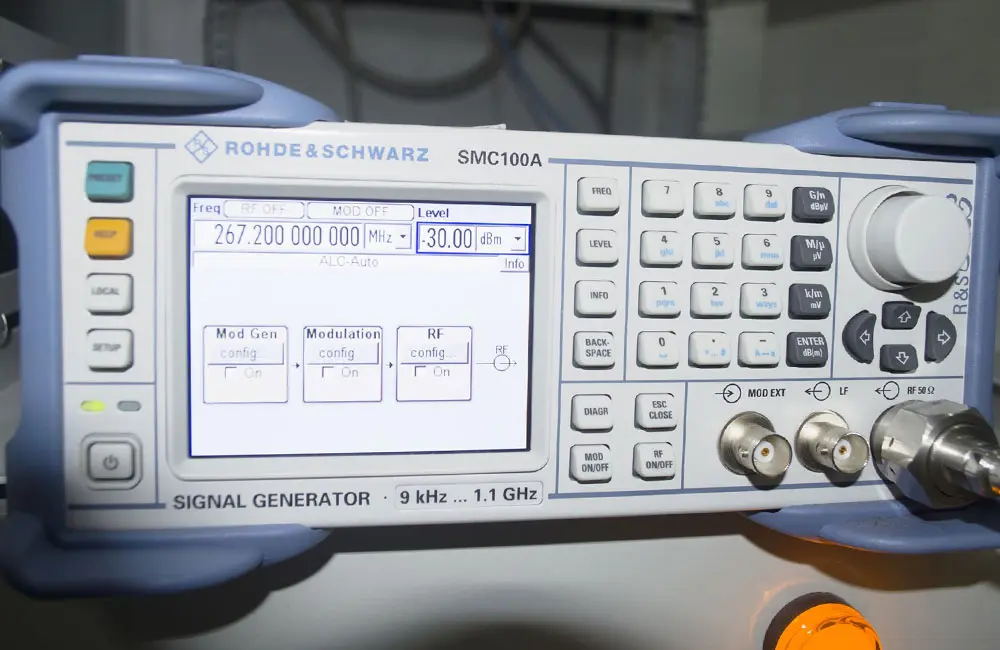
Bluetooth Electronic Scale FCC Certification
A Bluetooth electronic scale is an enhanced version of a traditional electronic scale, equipped with a Bluetooth modULe. This allows for the transmission of signal data over a certain distance, enabling mobile weighing. CompaRED to a standard electronic scale, the Bluetooth electronic scale offers better functionality for mobile weighing. As long as the device is within the Bluetooth signal reception range, users can operate the scale, and the data can be directly transmitted to a computer for data reading and storage via the appropriate software.

Overview of FCC Certification
Bluetooth electronic scales exported to the United States must undergo FCC certification. The full name of FCC certification is the Federal Communications Commission, established in 1934 as an independent agency of the U.S. government, reporting directly to Congress. The FCC regulates domestic and international communications through control of radio, television, telecommunications, satellite, and cable.
FCC Certification Modes
Currently, FCC certification is mainly divided into two modes: fcc sdoc certification and fcc id certification.
1. FCC sdoc Certification: On November 2, 2017, the Federal Communications Commission (FCC) officially transitioned the DoC & VoC programs to SDoC, aiming to simplify the certification process for wireless devices and clarify the usage guidelines for electronic labels. FCC SDoC has been fully implemented as of November 2, 2018. During the transition period, companies could continue to use the FCC VoC and DoC certification processes or directly use the new FCC SDoC certification process. After the transition period, the FCC SDoC certification process formally replaced the previous FCC VoC and DoC methods.
2. FCC-ID Certification: This mode is suitable for more technically complex wireless products. Products with wireless transmission frequencies, such as Bluetooth devices, WiFi devices, wireless alarm systems, radio receivers and transmitters, telephones, computers, etc., require FCC-ID certification. The certification of such wireless products is approved by the FCC TCB (Telecommunication Certification Body) and can be verified on the FCC’s official website. The certification process typically takes 3-4 weeks, and factory inspections are not required. If the product standards remain unchanged, the certification is valid indefinitely. The FCC certification for Bluetooth electronic scales falls under the FCC-ID mode.
Bluetooth Electronic Scale FCC Certification Standards
The main fcc standards include FCC PART 15 and PART 18, which are widely applied. The FCC certification standard for Bluetooth electronic scales applies to fcc part 15.
- FCC Part 15: This is part of the U.S. FCC certification (47CFR Part 15), covering electromagnetic interference standards (conducted and radiated interference) for radio frequency devices (both intentional and unintentional radiators). Radio frequency devices are defined as any device capable of emitting radio frequency energy by radiation, conduction, or other means during its operation. Most electronic devices fall under this category. The regulation mandates that electronic products of this type must undergo FCC certification before entering the U.S. market.
FCC Part 15 is composed of the following subparts:
- Subpart A - General
- Subpart B - Unintentional Radiators
- Subpart C - Intentional Radiators
- Subpart D - Unlicensed Personal Communications Service Devices
- Subpart E - Unlicensed National Information Infrastructure Devices
- Subpart F - Ultra-Wideband Operation
- Subpart G - Access Broadband Over Power Line (Access BPL)
- Subpart H - Television Band Devices
Required Documents for Bluetooth Electronic Scale FCC Certification
1. 2-3 product samples
2. Product certification application form
3. Circuit diagram
4. Product manual
5. List of key components
Bluetooth Electronic Scale fcc certification process
1. Fill out the Bluetooth electronic scale FCC certification application form for JJR Laboratory.
2. Sign the Bluetooth electronic scale FCC certification service agreement with JJR Laboratory.
3. The client provides complete test samples and accessories, which are submitted to JJR for testing.
4. The laboratory conducts testing and provides a test report.
5. Upon completion of testing, the fcc test report and certificate are issued.
6. Once the company obtains FCC certification, it can use the FCC mark on the product.
Email:hello@jjrlab.com
Write your message here and send it to us
 How Do You Get a CE Mark
How Do You Get a CE Mark
 IEC 60529 IP Rating Ingress Protection Standard
IEC 60529 IP Rating Ingress Protection Standard
 IEC 60601-1 Medical Electrical Equipment Basic Saf
IEC 60601-1 Medical Electrical Equipment Basic Saf
 European Authorized Representative Medical Devices
European Authorized Representative Medical Devices
 EU Waste Electrical and Electronic Equipment Direc
EU Waste Electrical and Electronic Equipment Direc
 How to Get CE Approval
How to Get CE Approval
 Accelerated Ageing Test
Accelerated Ageing Test
 IP Ingress Protection Testing
IP Ingress Protection Testing
Leave us a message
24-hour online customer service at any time to respond, so that you worry!




